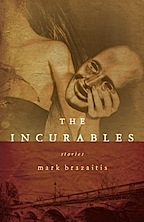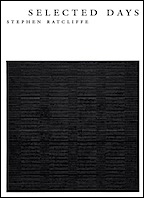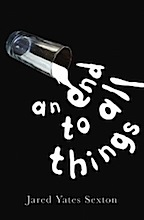
Book Reviews: January 2013
Holding Silvan: A Brief Life, Memoir by Monica Wesolowska
The Incurables, Short Stories by Mark Brazaitis
Selected Days, Poetry by Stephen Ratcliffe
An End to All Things, Short Stories by Jared Yates Sexton
fff
 Holding Silvan: A Brief Life
Holding Silvan: A Brief Life
Memoir by Monica Wesolowska
Hawthorne Books & Literary Arts, 2013
ISBN-13: 978-0986000713
$16.95; 202pp.
Reviewed by B.J. Hollars
The day after Silvan is born, Monica Wesolowska learns her son is not all right. In fact, he is the opposite. First, there is a blot clot, then a seizure, then a coma, and finally, a diagnosis: hypoxic ischemic encephalopathy. Yet the doctors’ ability to identify the ailment hardly serves as a cure. Rather, recognition of the infant’s oxygen deprivation functions as the death knell, confirmation of the “not-all-rightness” which will continue for thirty-eight excruciating days before his breathing stops for good. Yet between Silvan’s first and last breaths resides a story; one told with such candor that the reader knows not whether to reward Wesolowska for her brutal truths or plead for a lie, instead. When faced with the reality of their son’s hopeless future, Wesolowska and her husband make the difficult choice to remove Silvan’s feeding tube. “What we are doing for Silvan feels compassionate,” Wesolowska rationalizes, “what we are not doing is euthanasia…” Yet the words themselves fail to bear the burden of their meaning. It is a trope Wesolowska examines throughout: the ineffectiveness of language. When a friend asks Wesolowska if Silvan should die on his own, the mother thinks, “How relieved I am that she is someone who can use that word ‘die.’” (Wesolowska, herself cannot.) Later, when describing her love for her son, Wesolowska notes that, “what other people call ‘love’ is a lie, a mere convenient word.” Wesolowska’s own words, however, are never convenient. In fact, they are the words we least want to hear. Nevertheless, she spoons them down our throats like medicine, demanding we take our dose whether we like it or not. And we won’t like it. Despite the grace and bravery in Wesolowska’s words, we will find it difficult to enjoy the story. How can one ever enjoy a subject so raw it defies the words themselves? Reader beware: Wesolowska will break your heart beautifully, and she has no intention of fixing it.
 The Incurables
The Incurables
Short Stories by Mark Brazaitis
University of Notre Dame Press, 2012
ISBN-13: 978-0268022310
$20.00; 233pp.
Reviewed by Renée K. Nicholson
Mark Brazaitis introduces us to Sherman, Ohio, a Midwestern university town, during a crisis, in which people commit suicide by jumping from a prominent bridge. The local sheriff, a retired professor, quickly finds out that the sleepy town, whose usual concerns include co-ed mischief, has become the center of a morbid display of public suicide, culminating in a gruesome circus act, where people dressed as clowns are shot off the side of the bridge by a canon. While this is a dramatic display of madness, many of the stories in this collection take a subtler approach to the inner turmoil of the inhabitants of Sherman. The beauty of the locale is that Sherman could be anywhere—that is, we recognize some of our own towns within it—and its inhabitants could be people we know and encounter every day, making these stories immediate and identifiable.
Some of the inner strife rendered skillfully in these stories is familiar. In “The Boy Behind the Tree,” a father and son’s estrangement is heightened when a third player in their rounds of golf, Jack, increases the space between them. The easy rapport the father has with Jack compels the son to feel his father’s frustration with him. While Jack represents the imagined “perfect son” who cannot be matched by the narrator, it’s the tender understanding later in life, when the son earns the hesitant praise of his father for a novel he has written, that tentative revelation occurs: “even fathers who had little in common with their sons…can feel more than bewilderment and disappointment.” Other characters face more complex problems. Peter Marcello, the outgoing sheriff before the professor-turned-sheriff is elected, stands by his old friend Ray Perkins, who, in a psychotic break, kills his wife and children in what he believes is mercy for a coming apocalypse. Declared insane by the courts, Perkins receives therapy in an institution, and while Marcello’s loyalty to his friend costs him the election, he finds a greater sense of self worth and purpose in helping Perkins. His commitment to Perkins allows Marcello to repair his own life, making amends with his separated wife and child, and restoring Perkins’s failing business.
In the title story, Drew, a former porn star, returns to Sherman and soon after, voluntarily enters the psychiatric ward of Ohio Eastern University Hospital. Although in his former profession Drew performed physically naked, he is unable to strip down to the essential intimacy that leads to lasting human connections. Prior to his return, in a moment of vulnerability with a co-star, Drew allows himself to become infected with herpes—both a real affliction, but also, as his doctor suggests, a form of self punishment. He only starts to heal himself when he opens up to another patient, Erica, whose unhappiness is as profound as Drew’s. He finds some peace in wanting to help her, even though, as the book’s title suggests, they are incurable.
What these and the other stories in the collection suggest is that from the most outlandish and public of afflictions, to the most private, that which troubles and distresses us also links us to what makes us vulnerable and individual. The human condition is peculiar and delightful, if not incurable, filled with hard-earned peace, inner strife, awkwardness, small victories, vulnerabilities—if not in Sherman, then in our backyards; if not in these characters, then in those we know and love, including, perhaps, ourselves.
 Selected Days
Selected Days
Poetry by Stephen Ratcliffe
Counterpath Press, 2012
ISBN-13: 978-1933996288
$15.95; 200pp.
Reviewed by Anne Shaw
What happens when a car driven by David Hockney collides with a motorcycle driven by John Ashbery in Bolinas, California? Something like the painterly poetics of Stephen Ratcliffe, whose new Selected Days samples his last fifteen years of work. Ratcliffe’s surprising oeuvre offers a poetics of the objective, opting for an engaged and engaging alternative to conventional lyric subjectivity.
Insistently flat, colorful, and disjunctive, the poems are drawn from six serially written sequences of, variously, 474 or 1000 days. Eschewing a lyric “I,” Ratcliffe’s poems are schematic structures, registering the movements of animals, plants, and people in space and time. For example, in “Portraits & Repetition,” the page becomes a linguistic grid:
image of bird perched at the tip of a pine branch (position)
after its sound arrives, blue background of sky behind it
……………………………………………………………………….(“5.14,” 8).
Here, Ratcliffe’s technique owes much to Minimalism, where the key relationship is that between viewer and object. The focus of attention is on minute shifts of perception and positionality. Later poems move to more interpersonal topics by sampling thoughts, quotes, and feelings from the people who move through the page-space:
………………………………………………….woman on phone
………..sitting in tub when husband asks “are you
happy,” back-peddling from the thought she loves
someone else
……….…………..Cam thinking the island “scarcely
looked like a leaf, imagining bedrooms “fading
……….and disappearing” (56).
Rendered in this way, each detail takes on strange sense poignancy. Many of the poems seem to constitute a search for meaning in space, as if asking where human experience is located and to what degree it can be shared:
woman moving above the man in the dark, next view looking up
performed in the space between emotion and experience
………………………………………………………………………(“5.15,” 9).
Formally, the poems are often semantically-driven. For instance, in Human / Nature, the book’s central sequence, the poems begin with birds of a particular color, move to two internal quotes from artists (Kandinsky, Turner, Cezanne) and close with views of landscape. Like Matisse, Ratcliffe uses color and motif to explore the mechanics of recurrence and variation. For example, he invites comparison between such close thoughts as “grey / green mouth of wave breaking across channel below it” (“6.28,” 92) to “oval grey mouth of wave breaking into channel across from it” (“7.10,” 104).
In his invocation of painting, as well as his insistent framing of the page as a flat canvas (actions occur “in the foreground,” “to the left of the point”), Ratcliffe engages in a complex dialogue about subjectivity, the relationship between language and thing, and the interaction between poetry and visual art. Indeed, these long projects also constitute durational artworks. While the formula-driven poems at times risk monotony, the recurrent nature of everyday life and the rewards of close attention, are precisely the point. In Selected Days, the sheer joy of observation, of being in and of the world, are never far from the reader’s consciousness, or, one may infer, from the poet’s.
 An End to All Things
An End to All Things
Short Stories by Jared Yates Sexton
Atticus Books, 2012
ISBN-13: 978-0984040513
$14.95; 223pp.
Reviewed by Joe Ponepinto
The minimalist style of Sexton’s prose, like that of Carver and Hemingway, belies the complex relationships that comprise the majority of stories in his first collection. And odd it may seem at first, that Sexton, who is Fiction Editor for BULL (a magazine specializing in men’s fiction), writes not about hunting and man caves and other testosterone-fueled pursuits, but almost exclusively about relationships, the opposing views that the genders take toward modern life and the confusion and mistrust that results. What separates these tales from the usual stories about marital/significant other troubles, however, is an implication that saving the relationship, while sometimes desirable, is secondary to the individual’s (usually the man’s) self-respect—as if to say that the protagonist’s sense of self worth was already in question. It’s an interesting reflection on changing roles and values in our society.
The people in these stories come from the lower rungs of the economic stepladder, in many cases just above the poverty line. Sexton’s vignettes, and the vernacular of many of his characters, reflect the attitudes of this social category—no McMansions or Mercedes or lofty sentences here; instead Sexton’s is a world of bars and beer, TV sports, shit jobs and double-wides, and plain-spoken language, proud even in its colloqiualisms. There is violence, too, a clear nod toward both the news trend and the societal frustrations that seem, sometimes, to leave no other solution.
Much of the book serves as a commentary on events of the past decade and how they have affected American life. A sample from “The Right Men for the Job”:
It dawned on us that maybe our luck had run out. First the car started coughing and jumping to the right, then the hot water heater leaked so bad it fell through the laundry-room floor. We were trying to lift it out when the kids came running to tell us there was a man in the driveway. He’d hit a cat—our cat—and he wanted to apologize.
Before that everything seemed to be going our way. I was writing for the newspaper and sometimes people recognized me from the picture that ran next to my stories. Mary, my wife, had regular work as a substitute teacher and we were starting to pay off our debts. Our boys Sam and Spencer were happy and growing and never went without. They had toys and clothes and we bought a new car and appliances and every little thing that crossed our minds.
A couple of years passed and everything changed…
Trouble is, the characters in these stories, like much of the lower middle class in our country, don’t really know what they can do about the downturn in the economy or their lives, except to endure.
The culmination for these people, and perhaps for us real-world folk, comes in the collection’s final story, the title piece, “An End to All Things.” A mysterious cult leader predicts yet another end-of-the-world deadline, and the characters in this story take it to heart; in the self-indulgence that passes for morality in today’s America, they turn the doomsday prediction into an excuse for a party. As with the stories in Sexton’s first effort, that sounds about right.
